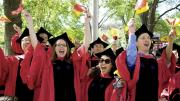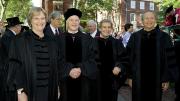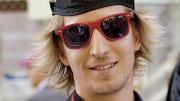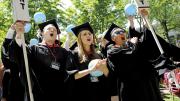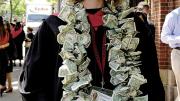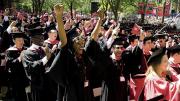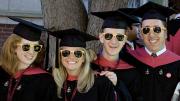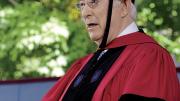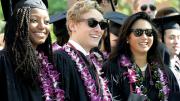When Commencement week dawned wetly, intervention seemed urgent. Memories remained painfully fresh of last October 14, when a near-monsoon gate-crashed the University’s 375th-anniversary bash. (Sodden revelry left Tercentenary Theatre looking like Woodstock, or the “cow yard” the newborn College fronted in 1636. Much of the slop had to be resodded.) As a damp Monday segued into a rainy Tuesday—moistened undergraduates trudged into the Phi Beta Kappa literary exercises and Baccalaureate service in limp, clinging gowns—forecast-watching became obsessive. Too late to book an encore performance by last year’s guest speaker, who secured clement weather by invoking higher powers: before setting out for Cambridge, Liberian president Ellen Johnson Sirleaf, M.P.A. ’71, LL.D. ’11, said she had consulted local witch doctors and told them to “send the African sun behind me.” Done. This year’s afternoon speaker, Fareed Zakaria, Ph.D. ’93—Mumbai-born but now a thoroughly Westernized foreign-affairs journalist and television host—seemed unlikely to have an open line to an equivalent shaman.
But the advisory committee on honorary degrees had presciently selected atmospheric scientist Mario Molina, a Nobel laureate, to be among the honorands. His faculty escort was James G. Anderson, Weld professor of atmospheric chemistry, usually an anchor in the Commencement broadcast booth; and his substitute for the day was colleague Daniel P. Schrag, Hooper professor of geology and professor of environmental science and engineering, a climate-change researcher. With three weather-savvy guys on hand for the Morning Exercises, Harvard pulled it off again: the anniversary year that began soaked ended on a high note of New England spring perfection: brilliant blue, lush green, cottony cloud and sweet sun, a favoring breeze or two.
Commencements, they say, are an end (those “bright college years”) and a beginning. So, too, the University in this anniversary year looked back (“In October 1636, Harvard College was not yet a place. It was an idea…,” said an insert in the Commencement program); took stock as of 2012; and peered ahead.
In a sense, Harvard tied up many loose ends during the year. ROTC (Navy and Army) returned to campus offices. Henry A. Kissinger ’50, Ph.D. ’54, L ’55 (absent seemingly longer than the military), returned to alma mater, at President Drew Faust’s invitation, for a Sanders Theatre forum and private dinner. In an explicit bit of symbolism, Faust asked her predecessors to join her in the morning’s procession into Tercentenary Theatre, and Derek C. Bok, Neil L. Rudenstine, and Lawrence H. Summers were then seated just in front of her on the dais alongside Memorial Church—a tableau of continuity as the University heads toward a capital campaign.
Faust, now concluding five years in office, employed this Janus-like theme most clearly in her afternoon speech, echoing ideas from her 2007 installation address, which outlined universities’ obligations to past, present, and future. History, she said, “shapes our institutional ideals as well as our individual ambitions. Having a history diminishes the grip of the myopic present, helping us to see beyond its bounds, to transcend the immediate in search of the enduring. It challenges us to place our aspirations and responsibilities within the broadest context of understanding.” On that basis, she looked forward, seeing a Harvard advancing from a firm anchorage: “This means that in the sciences—and beyond—we support research that is driven by curiosity, by the sheer desire to understand—at the same time that we pursue discoveries that have immediate measurable impact. And it means that we support fields of study—of languages, literatures, cultures—that are intended to locate us within traditions of reflection about the larger purposes of human existence, enabling us to look beyond ourselves and our own experience, to ask where we are going—not just how we get there.” Faust referred to that future as well, mentioning a learning and teaching initiative; edX, an online-education venture with MIT (see “Harvard, Extended” ); and Harvard’s Innovation Lab. (A shortened version of her speech appears as “History Is Where the Future Begins.”)
Many of the week’s events had this back-and-forth quality. The menu at the honorands dinner, in Annenberg Hall on Wednesday night, featured historic items, concluding with “hasty pudding” from a 1747 recipe—but there were also video projections (a first), including a snappy 375th slide show. The Commencement exercises, and associated visual diversions, were projected onto five huge LED screens this year (up from three)—meaning that some attendees had a better televised view than a live one.
In keeping with a Faust-era tradition—Wynton Marsalis tooting his horn in 2009, Plácido Domingo serenading Justice Ruth Bader Ginsburg last year—Nobel laureate Seamus Heaney, a former faculty member, returned to Harvard and read his stirring “Villanelle for an Anniversary,” commissioned for the gala 350th. He was followed by the Commencement Choir, who performed a new musical version of the poem, composed by Richard Beaudoin, preceptor in music. The poem, with its refrain about “gates unbarred,” echoed an event that was not much mentioned in the formal rhetoric: the Occupy Harvard encampment, at John Harvard’s feet, from November into January—during which the Yard’s gates were barred, and security personnel controlled access.
Faust touched on some of the occupiers’ concerns in her Baccalaureate address, on Tuesday. After the obligatory observation about the undergraduates’ extraordinariness, she reminded them of “another and parallel truth: which is that you—and I—are also supremely lucky. There are roughly 120 million 21-year-olds in the world. There are some 1,551 of you who will get degrees today. There is one of me who arrived here against similar odds. That is how we know the deck was stacked.” She cautioned them against allowing their opportunities to come “to seem like an entitlement, ours because we deserve it. We cease to recognize the role of serendipity, and we risk forgetting the sense of obligation that derives from understanding that things might have been otherwise.”
Other speakers were more explicit about graduates’ obligations in a challenging, contemporary world: Phi Beta Kappa orator Derek Bok warned against American’s neglect of their democracy; Donald Berwick painted a picture of new physicians’ enormous burden of care for their patients; and Radcliffe medalist Margaret H. Marshall presented an alarming view of the state of the judiciary (see “At the Mic” for excerpts from these and other speeches). The Harvard-Radcliffe fiftieth-reunion class of 1962—blessed with time and perspective—focused their symposiums on “compromised integrity” in business, government, and the professions, and how to respond. Attorney General Eric H. Holder Jr. addressed the law students; Christine Lagarde, the International Monetary Fund’s managing director, spoke at the Kennedy School.
Faust’s talk of “inexplicable luck” (and its opposite) became sadly specific with the death of M.B.A. candidate Nathan Bihlmaier, who drowned just five days before graduation; he left his wife, pregnant with their first child. The Business School’s Class Day speaker, Facebook COO Sheryl Sandberg ’91, M.B.A. ’95, adapted her remarks to observe the tragedy, and students wore black ribbons in his memory.
In the end, even little contingencies and coincidences knit the Harvard of May 24, 2012, together with its past and future. The tenth anniversary of 9/11, memorialized on campus last fall, found a resonance in the honorary degree conferred on John Adams ’69, A.M. ’72, winner of the 2003 Pulitzer Prize for his musical composition commemorating the victims of that attack. Seated near him on the stage was Neil Rudenstine, whom Adams had first encountered as a section leader in Humanities 2, an undergraduate course—the elemental, enduring student-teacher bond. And Fareed Zakaria, who came to the United States from India, was a reminder of Faust’s initial trip to the subcontinent last January, a sign of Harvard’s increasingly global aspirations in an interconnected world.
In the University’s progress from a rainy October anniversary party to a picture-perfect 361st Commencement, it seemed permissible to believe that however illustrious Harvard’s first 375 years had been, those to come would be brighter still.
